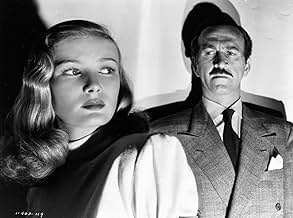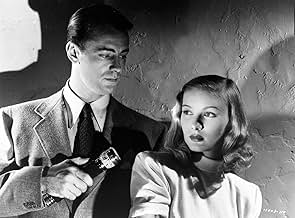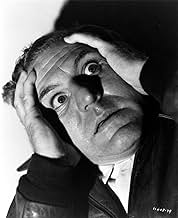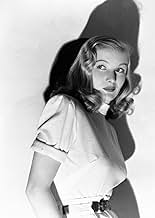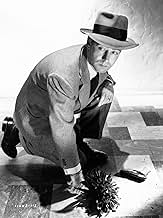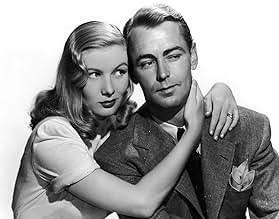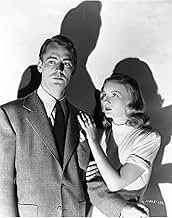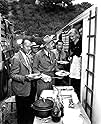An ex-bomber pilot is suspected of murdering his unfaithful wife.An ex-bomber pilot is suspected of murdering his unfaithful wife.An ex-bomber pilot is suspected of murdering his unfaithful wife.
- Nominated for 1 Oscar
- 1 win & 1 nomination total
Bea Allen
- News Clerk
- (uncredited)
Harry Barris
- Bellhop
- (uncredited)
George Barton
- Cab Driver
- (uncredited)
Mary Bayless
- Bar Patron
- (uncredited)
Edward Biby
- Restaurant Patron
- (uncredited)
Nina Borget
- Mexican Waitress
- (uncredited)
- Director
- Writer
- All cast & crew
- Production, box office & more at IMDbPro
7.110.2K
1
2
3
4
5
6
7
8
9
10
Featured reviews
Every guy's seen you before, somewhere. The trick is to find you.
The Blue Dahlia is directed by George Marshall and written by Raymond Chandler. It stars Alan Ladd, Veronica Lake, William Bendix & Howard Da Silva. Plot sees Ladd playing a navy officer who returns home to his unfaithful wife after fighting in the South Pacific. When she is found murdered he is the number one suspect, he must find who is responsible before it's too late.
Legend has it that Paramount Pictures were so pleased about the success of Double Indemnity, and in particular Raymond Chandler's writing on it, they handed the writer a contract, where, he produced this tightly wound film noir piece. Nominated for an Academy Award, Chandler had in fact had to give up his teetotaller way of life (he was a recovering alcoholic) so as to gain inspiration for the story. Also of note is that his original ending was shelved after objections by the U.S. Military Department, shame, because I believe that an already good film could have been a better one with Chandler's original denouement. Oh well, what's left is still rather rewarding to the genre faithful.
After This Gun for Hire and The Glass Key, this was the third pairing of Alan Ladd & Veronica Lake. Their working chemistry set in stone, it's nice that the film doesn't solely rely on the pair to make Chandler's material work. True enough their scenes have a tenderness to them, acting as a sort of warm place to go to when the harsher aspects in the plot hit home hard, but the film is far more than just the Ladd & Lake show. What marks it out as a worthy point of reference in the film noir cycle, is that it delves into the psyche of the servicemen returning home from the war. Observing how they were being received and showing that some of them also carried emotional scars as well as those ones gained in battle. Then Chandler mixes it in with a hard-boiled murder investigation as our wrongly accused protagonist trawls the mean streets of L.A. searching to clear his name. With that comes grungy premises' and periods of brutal violence, all cloaked moodily by the competent Marshall. Ladd does good work, very appealing yet tough, but it's Bendix who steals the movie with an intense portrayal of an ex serviceman with psychological issues.
With the original ending and a deeper exploration of the war veterans not being warmly received on homecoming, The Blue Dahlia would have been close to being a genre classic. The script and Bendix ensure, tho, that it's still very easy to recommend to like minded fans of the genre and its dark alley offshoots. 7.5/10
Legend has it that Paramount Pictures were so pleased about the success of Double Indemnity, and in particular Raymond Chandler's writing on it, they handed the writer a contract, where, he produced this tightly wound film noir piece. Nominated for an Academy Award, Chandler had in fact had to give up his teetotaller way of life (he was a recovering alcoholic) so as to gain inspiration for the story. Also of note is that his original ending was shelved after objections by the U.S. Military Department, shame, because I believe that an already good film could have been a better one with Chandler's original denouement. Oh well, what's left is still rather rewarding to the genre faithful.
After This Gun for Hire and The Glass Key, this was the third pairing of Alan Ladd & Veronica Lake. Their working chemistry set in stone, it's nice that the film doesn't solely rely on the pair to make Chandler's material work. True enough their scenes have a tenderness to them, acting as a sort of warm place to go to when the harsher aspects in the plot hit home hard, but the film is far more than just the Ladd & Lake show. What marks it out as a worthy point of reference in the film noir cycle, is that it delves into the psyche of the servicemen returning home from the war. Observing how they were being received and showing that some of them also carried emotional scars as well as those ones gained in battle. Then Chandler mixes it in with a hard-boiled murder investigation as our wrongly accused protagonist trawls the mean streets of L.A. searching to clear his name. With that comes grungy premises' and periods of brutal violence, all cloaked moodily by the competent Marshall. Ladd does good work, very appealing yet tough, but it's Bendix who steals the movie with an intense portrayal of an ex serviceman with psychological issues.
With the original ending and a deeper exploration of the war veterans not being warmly received on homecoming, The Blue Dahlia would have been close to being a genre classic. The script and Bendix ensure, tho, that it's still very easy to recommend to like minded fans of the genre and its dark alley offshoots. 7.5/10
Good noir, good performances
"The Blue Dahlia" is a flower and a nightclub, both of which figure in the plot of this 1946 film starring Alan Ladd, Veronica Lake, William Bendix and Howard da Silva. There's plenty of the busy, somewhat chaotic post-war atmosphere in this movie as war pals Johnny Morrison (Ladd), Buzz Wanchek (Bendix) and George Copeland (Hugh Beaumont) return from service. While the brain-damaged Buzz and Copeland get an apartment together, Morrison returns to his beautiful wife (Doris Dowling) whom he finds has been living a wild, party-filled existence and cheating on him with club owner Eddie Harwood (da Silva). Hurt and angry, Morrison, trying to get a cab in the rain, is picked up by none other than a beautiful blond named Joyce, who he does not know is actually Mrs. Harwood. After parting company, they both stay at the same inn without realizing it. The next morning, Morrison hears on the radio that his wife is dead, and the police are looking for him. On the run, and with some help from Joyce, Morrison tries to find out who really killed his wife.
This is a pretty good noir with a solid, effective performance from Ladd and excellent work by both Bendix and da Silva. There are plenty of suspects, too - viewers will have their pick. Though "The Blue Dahlia" is a decent noir, it's the frenetic post-war energy that makes it watchable rather than the story, which as one reviewer here pointed out, has the strange coincidence of Johnny being picked up by Mrs. Harwood. The other odd thing to this viewer, anyway, is the fact that the Bendix character is so obviously brain-damaged from the war (he has a plate in his head), yet no one seems to really pick up on it, or at least acknowledge it, until later in the film. He's told to pull himself together and allowed to drink. Meanwhile, loud music drives him nearly insane, and he suggests getting on a bus, not remembering he just got off of it.
The Veronica Lake role is criticized - it's true she doesn't have much to do; it's also true that not many people liked working with her; and that she wasn't the world's greatest actress (Raymond Chandler called her Moronica), but she and Ladd made a great, if short, team, and she was always beautiful to look at and listen to.
All in all, worth watching for one of the great noir teamings and some good performances.
This is a pretty good noir with a solid, effective performance from Ladd and excellent work by both Bendix and da Silva. There are plenty of suspects, too - viewers will have their pick. Though "The Blue Dahlia" is a decent noir, it's the frenetic post-war energy that makes it watchable rather than the story, which as one reviewer here pointed out, has the strange coincidence of Johnny being picked up by Mrs. Harwood. The other odd thing to this viewer, anyway, is the fact that the Bendix character is so obviously brain-damaged from the war (he has a plate in his head), yet no one seems to really pick up on it, or at least acknowledge it, until later in the film. He's told to pull himself together and allowed to drink. Meanwhile, loud music drives him nearly insane, and he suggests getting on a bus, not remembering he just got off of it.
The Veronica Lake role is criticized - it's true she doesn't have much to do; it's also true that not many people liked working with her; and that she wasn't the world's greatest actress (Raymond Chandler called her Moronica), but she and Ladd made a great, if short, team, and she was always beautiful to look at and listen to.
All in all, worth watching for one of the great noir teamings and some good performances.
Ladd and Lake
Blue Dahlia, The (1946)
** 1/2 (out of 4)
Alan Ladd plays a pilot returning home after serving in WWII only to discover that his wife has been cheating on him. The wife ends up dead and Ladd is the main suspect so he takes off to prove his innocence and this is when he meets the wife (Veronica Lake) of the man who was having an affair with his wife. This film has the reputation of being a classic but I wouldn't hold it up that high as I found some of the plot to be rather boring and many scenes stretched out too long. With that said, the film does offer up some nice performances and fans of noir will probably want to check it out. I think the main reason to watch the film is for the performance of Ladd. He manages to be very believable in the role and I loved how laid back he was no matter what was going on. He could be flirting with Lake or fighting off some thugs but he remains the same level of calmness throughout. As for Lake, I wouldn't say she gives a good performance but she fits her role just fine. William Bendix and Hugh Beaumont play Ladd's buddies who also return home with him. I found Bendix to be quite good in his role, although I think the "monkey music" dialogue gets a bit old. Howard Da Silva, Howard Freeman, Doris Dowling and Tom Powers do nice work as well. The film contains some pretty good cinematography and director Marshall is able to build up a nice atmosphere throughout. The biggest problem I had with the film is that it really doesn't try to be anything that we haven't seen before. The dialogue isn't the strongest and it's pretty obvious who the killer is from the first time we see him. That is, the original killer. The studio changed the ending of the film and the new killer doesn't work at all and it comes across incredibly forced and stupid. So, either way, the ending really doesn't work because had they kept the original killer then it was way too obvious. The way they changed the killer comes off very silly. Either way, Ladd makes the film worth viewing at least once.
** 1/2 (out of 4)
Alan Ladd plays a pilot returning home after serving in WWII only to discover that his wife has been cheating on him. The wife ends up dead and Ladd is the main suspect so he takes off to prove his innocence and this is when he meets the wife (Veronica Lake) of the man who was having an affair with his wife. This film has the reputation of being a classic but I wouldn't hold it up that high as I found some of the plot to be rather boring and many scenes stretched out too long. With that said, the film does offer up some nice performances and fans of noir will probably want to check it out. I think the main reason to watch the film is for the performance of Ladd. He manages to be very believable in the role and I loved how laid back he was no matter what was going on. He could be flirting with Lake or fighting off some thugs but he remains the same level of calmness throughout. As for Lake, I wouldn't say she gives a good performance but she fits her role just fine. William Bendix and Hugh Beaumont play Ladd's buddies who also return home with him. I found Bendix to be quite good in his role, although I think the "monkey music" dialogue gets a bit old. Howard Da Silva, Howard Freeman, Doris Dowling and Tom Powers do nice work as well. The film contains some pretty good cinematography and director Marshall is able to build up a nice atmosphere throughout. The biggest problem I had with the film is that it really doesn't try to be anything that we haven't seen before. The dialogue isn't the strongest and it's pretty obvious who the killer is from the first time we see him. That is, the original killer. The studio changed the ending of the film and the new killer doesn't work at all and it comes across incredibly forced and stupid. So, either way, the ending really doesn't work because had they kept the original killer then it was way too obvious. The way they changed the killer comes off very silly. Either way, Ladd makes the film worth viewing at least once.
Third Ladd/Lake pairing not all it's cracked up to be
The Blue Dahlia is among the dozen or so titles that movie buffs would identify instantly as film noir. Certainly, it boasts all the proper credentials: Alan Ladd and Veronica Lake reunited for their third outing together (after This Gun For Hire and The Glass Key); a sinister supporting cast including William Bendix, Howard Da Silva and Hugh Beaumont; and an original screenplay by none other than Raymond Chandler.
It almost lives up to its reputation. Returning Navy hero Ladd finds that the wife he left behind has turned into (or always was) a faithless party girl, who killed their young son in a drunken accident. He walks out on her, later to learn she's been murdered. Hunted by the police, he's befriended by Lake, who turns out to be rather intimately involved in much of what happened....
Many noirs suffered from studio-imposed "happy" endings but generally kept their integrity until the closing few frames. The changes wrought on The Blue Dahlia, however, severely compromise it. Chandler's original killer was to be Ladd's war-buddy Bendix, the loose cannon with a steel plate in his head, erupting in pounding headaches and blackout rages whenever he hears "jungle music" -- the sexually liberating beat of postwar prosperity. Rejecting this ending as an insult to the gallant men who had won the war, Paramount, pressured by the Navy, forced Chandler to resort to a lame "the-butler-did-it" conclusion. Unfortunately, that compromise splashes back through the length of the movie, making little sense of Bendix' performance -- even of his presence, except as the rankest of red herrings -- and turning what might have been a topical and disturbing film noir into just another glossy '40s murder mystery.
It almost lives up to its reputation. Returning Navy hero Ladd finds that the wife he left behind has turned into (or always was) a faithless party girl, who killed their young son in a drunken accident. He walks out on her, later to learn she's been murdered. Hunted by the police, he's befriended by Lake, who turns out to be rather intimately involved in much of what happened....
Many noirs suffered from studio-imposed "happy" endings but generally kept their integrity until the closing few frames. The changes wrought on The Blue Dahlia, however, severely compromise it. Chandler's original killer was to be Ladd's war-buddy Bendix, the loose cannon with a steel plate in his head, erupting in pounding headaches and blackout rages whenever he hears "jungle music" -- the sexually liberating beat of postwar prosperity. Rejecting this ending as an insult to the gallant men who had won the war, Paramount, pressured by the Navy, forced Chandler to resort to a lame "the-butler-did-it" conclusion. Unfortunately, that compromise splashes back through the length of the movie, making little sense of Bendix' performance -- even of his presence, except as the rankest of red herrings -- and turning what might have been a topical and disturbing film noir into just another glossy '40s murder mystery.
Good Ladd, Superfluous Lake, Great Bendix
The trailer for The Blue Dahlia advertised the film as Ladd, Lake, and Bendix. Not a mention about Raymond Chandler, maybe he wanted it that way.
The Blue Dahlia has mystery writer Raymond Chandler writing an original screenplay and Chandler delivers a good movie for the most part. Nice suspenseful noir film, but it could have been better.
The main weakness in the plot is Veronica Lake. Chandler couldn't stand her and called her Moronica Lake as a reflection of her acting ability. In fairness it's a poorly defined role and her meeting with Alan Ladd in this film is too too coincidental. I guess you had to give the star a love interest, but the idea that Ladd is hunting for the killer of his wife and just happens to come upon the wife of his number one suspect is way too unreal.
The number one suspect of the killing is Howard DaSilva. If I had to name the best performance in this film it would have to be DaSilva. He's the dapper, elegant owner of a Hollywood nightclub, but he exudes a menace that chills you. His best scene in the film is paying off blackmailer Will Wright. He pays him, THIS TIME. Wright gets the message he'd better not come back for more.
I believe it was Raymond Chandler who also said that Alan Ladd was a small boy's idea of a tough guy. That is unfair to Ladd who delivers a more than competent performance here as the returning war veteran who's on the hunt for his wife's killer while being suspected of the crime itself.
Check out Alan Ladd's scene at the farm with DaSilva's thugs. Very similar in the way they end up to how Bogart handled the baddies in The Big Sleep.
Bill Bendix gets in the top billing with stars Ladd and Lake because he's also a radio star because of the Life of Riley Show. Bendix and Hugh Beaumont are Ladd's wartime buddies and Bendix never was bad in any film he did. He shows signs of post traumatic stress at a time when that diagnosis had not been invented.
A bit too contrived, but a nice film noir.
The Blue Dahlia has mystery writer Raymond Chandler writing an original screenplay and Chandler delivers a good movie for the most part. Nice suspenseful noir film, but it could have been better.
The main weakness in the plot is Veronica Lake. Chandler couldn't stand her and called her Moronica Lake as a reflection of her acting ability. In fairness it's a poorly defined role and her meeting with Alan Ladd in this film is too too coincidental. I guess you had to give the star a love interest, but the idea that Ladd is hunting for the killer of his wife and just happens to come upon the wife of his number one suspect is way too unreal.
The number one suspect of the killing is Howard DaSilva. If I had to name the best performance in this film it would have to be DaSilva. He's the dapper, elegant owner of a Hollywood nightclub, but he exudes a menace that chills you. His best scene in the film is paying off blackmailer Will Wright. He pays him, THIS TIME. Wright gets the message he'd better not come back for more.
I believe it was Raymond Chandler who also said that Alan Ladd was a small boy's idea of a tough guy. That is unfair to Ladd who delivers a more than competent performance here as the returning war veteran who's on the hunt for his wife's killer while being suspected of the crime itself.
Check out Alan Ladd's scene at the farm with DaSilva's thugs. Very similar in the way they end up to how Bogart handled the baddies in The Big Sleep.
Bill Bendix gets in the top billing with stars Ladd and Lake because he's also a radio star because of the Life of Riley Show. Bendix and Hugh Beaumont are Ladd's wartime buddies and Bendix never was bad in any film he did. He shows signs of post traumatic stress at a time when that diagnosis had not been invented.
A bit too contrived, but a nice film noir.
Did you know
- TriviaThe pressure of having to finish the screenplay combined with the curveball of having to write an entirely new ending was too much for Raymond Chandler. He quickly came down with a severe case of writer's block. According to a near-legendary story, Chandler offered to finish the screenplay by working drunk; in exchange for sacrificing his health to produce the requisite pages on time, Chandler was permitted to work at home (a privilege rarely granted to screenwriters) and was provided two chauffeured cars, one to convey the completed pages to the studio and the other for his wife. Chandler turned the script in on time. Many now believe the drunkenness was simply a ruse by Chandler to wrangle extraordinary privileges from the desperate studio.
- GoofsJoyce tells Johnny that the tide is out. Clearly the tide is all the way in, completely covering the beach.
- Quotes
Joyce Harwood: Well, don't you even say 'Good night'?
Johnny Morrison: It's "good-bye", and it's tough to say good-bye.
Joyce Harwood: Why is it? You've never seen me before tonight.
Johnny Morrison: Every guy's seen you before somewhere. The trick is to find you.
- ConnectionsFeatured in Alan Ladd: The True Quiet Man (1999)
- How long is The Blue Dahlia?Powered by Alexa
Details
- Release date
- Country of origin
- Language
- Also known as
- La dalia azul
- Filming locations
- Production company
- See more company credits at IMDbPro
Box office
- Gross US & Canada
- $2,700,000
- Runtime
- 1h 36m(96 min)
- Color
- Aspect ratio
- 1.33 : 1
Contribute to this page
Suggest an edit or add missing content


